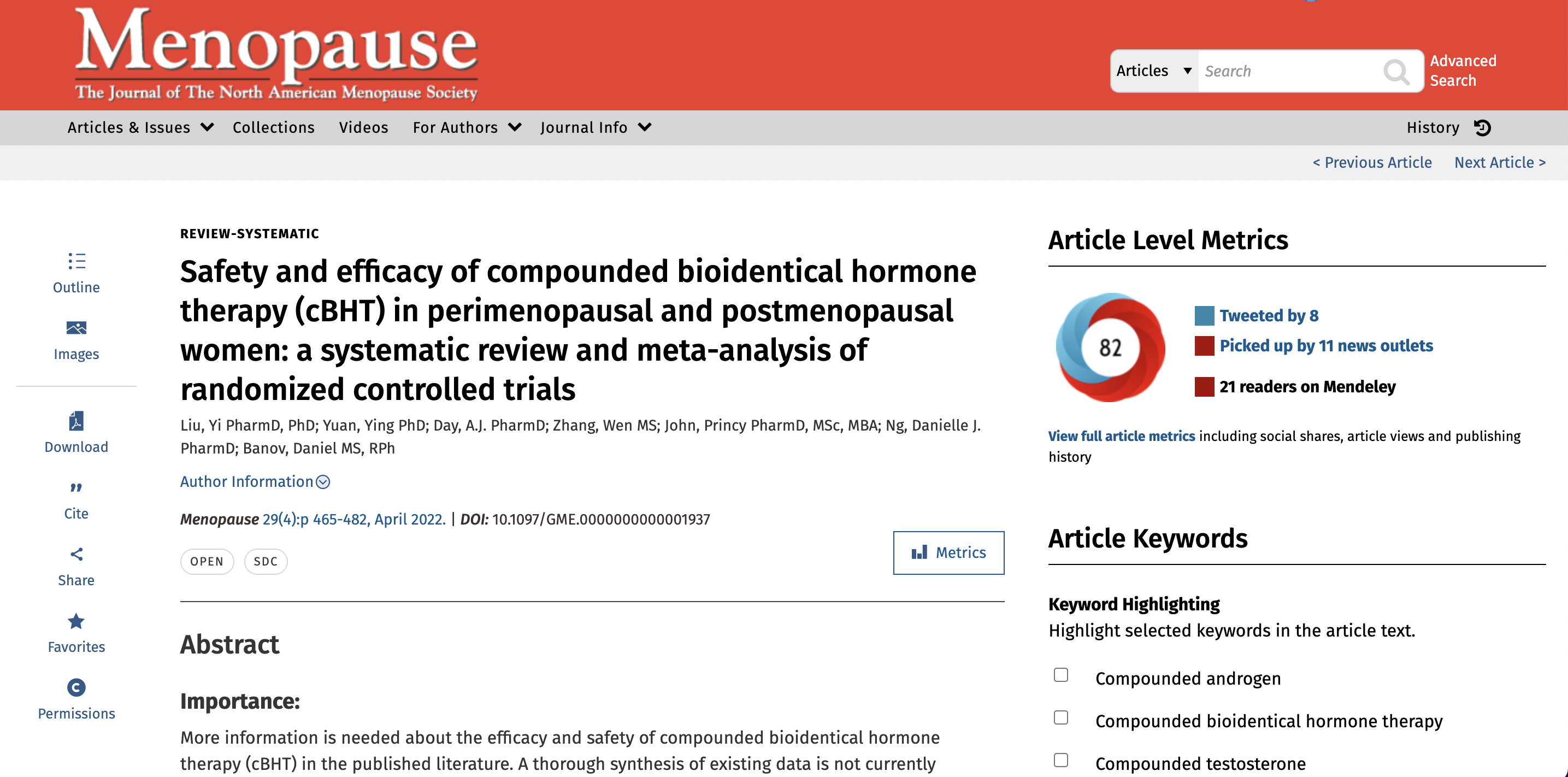The NASEM Report is troubling, at best
A 2020 FDA-funded report on compounded hormones from the National Academies of Science, Engineering and Medicine recommends across-the-board restrictions on compounded hormones. These restrictions would undermine physicians’ professional judgment and interfere with the practice of medicine, and could prove catastrophic for millions of patients who benefit from those therapies. But that NASEM report is compromised by potential bias, conflicts of interest, and bad science.

Committee members had little to no experience in compounded hormones
Most, if not all, of the NASEM committee members lacked any real-world experience prescribing and dispensing compounded hormones to patients. In essence, the committee was asked to develop recommendations on a topic in which they had little or no expertise.
Explore the NASEM Report's Flaws
The biggest flaw in the NASEM report is the committee's decision to ignore the vast bulk of patient-outcome research on compounded hormones.
The NASEM report is neither an accurate or complete understanding of compounded hormones.
The committee had access to hundreds of articles, peer-reviewed literature, research reports, books, and other quantitative data from key stakeholders, including the testimony of thousands of patients. They had access to hundreds of articles that the committee itself identified through its own literature review process.
And yet they base their entire report on 13 studies, or less than one percent of the available data, most of which did not even include the most commonly compounded hormones. Why?
.png)
The review that NASEM was expected but failed to do
While limited in scope, a new meta-analysis of patient outcomes reveals that compounded hormones provide real benefits to patients and also find that compounded hormones pose no increased risk compared to FDA-approved products.
As part of its commission, NASEM was to review the body of patient-outcome studies for compounded hormones. NASEM chose to ignore that data, instead selecting only 13 studies to include in its report, mostly featuring hormones that are not among the most commonly prescribed. (Studies that matched their predetermined outcome?)
This report, published in Menopause, the journal of the North American Menopause Society, is exactly the kind of unbiased research that NASEM should have done but didn't.

"...compounded hormones provide real benefits to patients and finds that compounded hormones pose no increased risk compared to FDA-approved products."

The facts matter more than ever
Read a third-party, independent analysis of the NASEM cBHT Report commissioned by the Pharmacy Compounding Foundation.

The NASEM Report
Bias may have influenced the conclusions and recommendations of the committee
Committee members
The FDA improperly influenced the makeup of the committee in direct conflict with the committee's stated objectives for independence, transparency and objectivity.
Review team
The FDA pushed for a former FDA staffer, with oversight on compounding, be added to the committee. She declined because of a stated conflict of interest, yet still, improperly, served on the review team.
A lack of expertise
The committee did not include any prescribers or pharmacists with substantive, patient-facing experience with compounded hormones. It was asked by the FDA to make recommendations on a topic about which it new little.
without evidence
The former FDA official's presentation to the committee is indistinguishable from her position as the FDA lead on compounding. This blatant conflict of interest means the official's role in the process maker her a proxy for the FDA.
Preordained results
By including a former FDA official, a known critic of compounding with oversight over the industry, heavily in the process, the FDA ensured that the NASEM report reached the conclusions the FDA wanted.
Federal law stipulates an important role for compounded medications in American health care.
The NASEM committee labors under the belief that compounded medications must be subject to the same approval process that manufactured drugs must meet.
Nonsense. Even the Supreme Court, in Thompson v Western States Medical, recognized the critical role that compounding pharmacy for patients "with particular needs may obtain medications suited to those needs."
Why has the committee decided in this case to impose requirements that the Supreme Court rejected?

-
My symptoms slowly lifted over a few weeks and now, two years later, my life is better than it's ever been. I have no crippling depression, I’m able to sleep, I have energy and motivation to do the things I enjoy...
Watch the video

BETH W. / Oklahoma City
-
I started using bioidentical hormones, both the estrogen and progesterone. Within one week I started regaining strength and leave the house. With in three weeks I was back to normal.
Watch the video

LAURA L. / Santa Ana, CA
Manufactured hormones cannot serve everyone
Most people who take compounded hormones began by taking the FDA-approved, manufactured drugs first. And for a variety of reasons, those therapies weren’t appropriate. By the time a physician prescribes a compounded hormone, patients are typically suffering significantly and have found no relief in the mass-produced solutions. Compounded hormones are not an alternative; for millions of people, they are the only viable option.
The NASEM report is dubious at best, misleading at worst. The conclusions that the committee made, the recommendations that follow, risk long-term, significant patient harm to millions of people and a severe intrusion on physicians' ability to care for their patients.
Compounded hormones are an important medical therapy that millions of people depend on. It must be protected.
In their own words
Explore our interactive map that demonstrates the importance of compounded medicines to patients all across the country. Filter these first-hand accounts by state to see just how vital compounded medicines are.
.png)
Invest in protecting compounded hormones
Our campaign to protect access to compounded hormones needs your support. We need your involvement. We need your voice. And, yes, we need your financial support as well.
Footnotes
-
https://www.fda.gov/drugs/human-drug-compounding/compounding-and-fda-questions-and-answers
-
https://www.fda.gov/drugs/human-drug-compounding/compounding-and-fda-questions-and-answers


